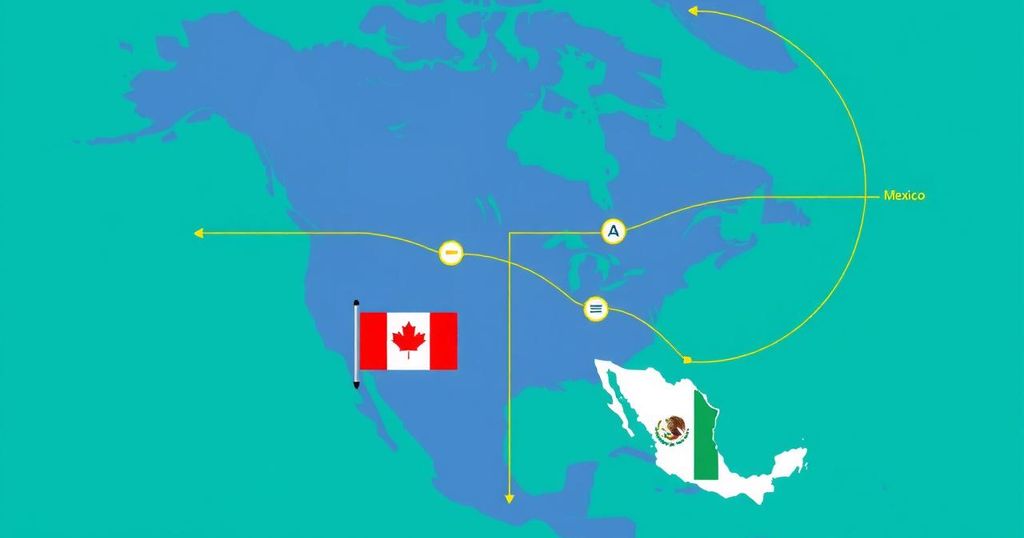Politics
AFP, ASIA, BELARUS, BLOOMBERG, CANADA, CLAUDIA SHEINBAUM, CUBA, DONALD TRUMP, EUROPE, EUROPE/ASIA, HURRICANE BERYL, INDIA, LEGAL ISSUES, MARK CARNEY, MEXICO, NATIONAL SECURITY, NORTH AMERICA, NORTH KOREA, PHILIPPINES, POLITICS, RUSSIA, TREASON, TRUMP, U.S. ELECTIONS, UNITED STATES, US, WHITE HOUSE
Fatima Khan
0 Comments
Canada and Mexico Exempt from Trump’s April 2 Reciprocal Tariffs
On April 2, 2023, President Donald Trump announced reciprocal tariffs starting at 10 percent, exempting Canada and Mexico. Despite the exemption, both nations will continue facing existing tariffs. New automotive tariffs are imminent, and Prime Minister Mark Carney vowed counter-measures for protection. The broader tariff scenario affects numerous countries with varying rates and highlights ongoing trade tensions, especially with China.
On April 2, 2023, United States President Donald Trump announced a new set of reciprocal tariffs. While many nations faced tariffs starting at 10 percent, Canada and Mexico were notably exempted from these additional charges. The President stated that the U.S. had been “looted, pillaged, raped, plundered” by other countries. This announcement provided immediate relief for Canada and Mexico, allowing them to avoid further economic strain from tariffs that could increase up to 45 percent.
Despite the exemption from the new tariffs, Canada and Mexico are not entirely in the clear. Existing tariffs on their goods are still in effect. Earlier this year, a 25 percent tariff was imposed on imports from both nations, along with additional levies on Canadian energy and potash. Moreover, new tariffs on automotive products are set to take effect soon.
The exemption for Canada and Mexico stems from the current duties in place, specifically 25 percent tariffs related to fentanyl and additional charges on energy products from Canada. Goods traded under the US-Mexico-Canada Agreement will also continue to be exempt from new tariffs. Prime Minister Mark Carney of Canada has pledged to counter these tariffs while ensuring protection for Canadian workers.
Additionally, the new tariffs affect several countries differently, with rates varying from 10 percent for some to as high as 45 percent for others, including Vietnam. Notably, China will face a substantial 34 percent tariff. President Trump had earlier committed to imposing a remarkable 60 percent tariff on Chinese imports during his 2024 campaign, aiming to address the $295 billion trade surplus China holds with the U.S. in 2024.
In summary, while Canada and Mexico have successfully avoided the latest set of tariffs, they remain subject to existing duties. Their future relations concerning trade will depend on the handling of current levies and ongoing negotiations under the US-Mexico-Canada Agreement. The broader implications of these tariffs extend into many nations, signaling a continuing trend of protective economic measures by the U.S. government.
In conclusion, Canada and Mexico have successfully dodged Donald Trump’s new April 2 reciprocal tariffs, enjoying a temporary respite from additional economic constraints. However, they must still navigate existing tariffs that pose challenges to their trade relations. The situation represents a delicate balance between protectionist policies and international trade agreements, with profound effects on a global scale. The forthcoming responses from Canadian and Mexican leaders will further influence this trade landscape.
Original Source: www.hindustantimes.com




Post Comment